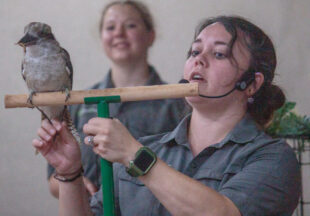Stephens County moves to Stage 4 as COVID-19 cases surge across the state, county

By Tony Pilkington/Breckenridge Texan
On Friday, Stephens County moved from Stage 1 (No Restrictions) to Stage 4 (High Restrictions) of the Community Health Plan due to recent increases in COVID-19 cases. According to Stephens County Judge Michael Roach, the county took the action because of the recent surge of cases in the county and because the ICUs in regional hospitals are full.
Roach said that as of Thursday, regional hospital Intensive Care Unit capacity had already been exceeded. He said one COVID-19 patient from Breckenridge had to be flown by airplane to Albuquerque, New Mexico, early Friday morning because there were no ICU rooms available in the region. He said the local hospital staff called more than 20 hospitals before they could find one that could take the patient, and that one was in Albuquerque. He said the patient was flown out just a little after midnight on Friday morning.
The shortage of hospital space is not just affecting COVID-19 patients. Chris Curtis, director of new business for Stephens Memorial Hospital and the person who tracks coronavirus cases for the hospital and the county, said they are back where they were earlier in pandemic, having to fly critical patients to ICUs hundreds of miles away to places like Amarillo and Albuquerque.
Curtis said of the current nine active COVID-19 cases, they’ve had to transfer four of the patients out of Stephens County.
“But, the issue is, too, we’ve had to Careflight out people far, far away for cardiac issues and things that are not COVID related because there’s no ICU beds available anywhere,” he said. “Yeah…all of the people that we’re having to send to all of these far off places are not even all COVID related.”
Community Update
In a community update video on Friday, Gena Speer, chief nursing officer for Stephens Memorial Hospital, said Stephens County has been classified as a high risk area because the county is seeing widespread community transmission of COVID-19.
“We’re see alarming numbers of new cases coming in our ER, coming in clinics …,” she said. “We’ve transferred quite a few (patients) out. And it seems like more every day. We’re already facing capacity issues at the hospitals that we transfer to. We’re having a hard time finding beds, finding ICU beds, even for patients who don’t have COVID.”

Gena Speer, chief nursing officer at Stephens Memorial Hospital, gives a community update via video on Friday, July 30, regarding the local COVID-19 situation. (Video screenshot)
She said area hospitals are getting full and were already understaffed because the healthcare workforce has decreased with COVID-19. She mentioned the patients who had to be transferred to Amarillo and Albuquerque and said that when they are unable to transfer patients to the bigger hospitals, the patients must stay in the SMH emergency room, which does not have the capabilities to provide the higher level of care the larger hospitals offer.
“That means that the longer they’re here, the longer it is before they’re getting the care they actually need,” Speer said. “So it definitely increases the risk of death, increases risk of complications, usually a longer illness. And then of course if we transfer them far away, it’s a little difficult for even just the logistics of how you can get the person home when they’re discharged, how their family gets to them. That’s not a quick little drive to get to their family.”
One difference they are seeing from the last surge in COVID-19 cases, Speer said, is they are seeing younger and sicker patients. She said two of the reasons for the increases: (1) the lower vaccination rate among younger people because they didn’t see as much need to get vaccinated, and (2) they are primarily seeing the delta variant, which has become the most common strain in the United States.
The delta variant is more contagious and more contagious at an earlier point after exposure. It causes illness more quickly and, from what the health experts can tell, it has a higher viral load than the original virus or than any of the other variants.
“So really, all of that just means that if the people do get it, they get sick and they get sick faster, and when they’re sick, they’re more contagious,” Speer said in the video. “That’s really, really concerning as summer vacations are finishing up and people are traveling, but also as kids are going back to school, college students are going back to school. There’s a lot of concern when…those take place.”
According to a July 29 article in the Texas Tribune, hospital and health officials across Texas are seeing similar dramatic jumps, straining an already decimated health care system that is starving for workers in the aftermath of previous coronavirus surges.
On Thursday, 314 patients with COVID-19 were reported in area hospitals In Travis County and surrounding counties, a number not seen since late February.
In Dallas County, COVID-19 hospitalizations have increased by 99% over the past two weeks, reaching 376 earlier this week. Their local numbers are expected to hit between 800 and 1,000 by mid-August, according to forecasters at UT-Southwestern Medical Center.
Overall on Thursday, Texas hospitals reported 5,662 patients hospitalized with COVID-19. A week earlier, COVID-19 hospitalizations were 3,566. On July 1, it was 1,591.
As of Friday there were no COVID-19 patients in SMH, according to Curtis. However, there are nine confirmed cases in Stephens County, but none are hospitalized locally.
Community Health Plan
Roach said the system of color-coded stages was developed earlier in the pandemic by a local emergency management team composed of Stephens Memorial Hospital health care providers, local doctors and the county judge. He said the system was devised to use data points and a numbering system to provide structure for moving up and down the levels to avoid knee jerk reactions and things like that.
“When we built that, we said, ‘OK, what, really gets us to a critical level?’” he said. “And one of those things is hospital capacity. When (regional) hospital capacity is compromised, that runs us up. And then stage five would be absolutely no beds available locally. Then, our own hospital capacity would be compromised and we couldn’t take anybody.”
Stephens County went from Stage 1 on Monday to Stage 4 on Friday. Hendrick Health in Abilene moved from Level 2: Concern on Monday to Level 4: Severe on Wednesday.
Unvaccinated patients
During her update, Speer said that in Texas more than 90 percent of the people who are hospitalized with COVID-19 have not been vaccinated and that 99.5 percent of the deaths from COVID-19 in Texas are people who have not been vaccinated. She said that while there are some vaccinated people who are hospitalized or who get sick, it’s much less likely to happen.
According to Roach, three of the 10 reported active cases in the past two weeks were people who had already been vaccinated. Two had received the Johnson & Johnson vaccine, and one had received the Moderna vaccine.
Roach said two of the patients who were airlifted from Breckenridge by helicopter because of serious COVID-19 complications had received the Johnson & Johnson vaccine. The other person had received the Moderna vaccination and had very mild symptoms, he said.
He said both patients who were taken by Careflight are in their 60s. He said the woman was very sick, had pneumonia and had to be transferred by Careflight. Then later, Roach said, local law enforcement personnel responded to a welfare check requested for her husband at his home and found him to be very ill, as well.
“Law enforcement responded, of course, in full PP (personal protective gear), and went to the home and he could not even get out of the bed. They called an ambulance, and his ability to breathe became critical in route, and so they took him straight to the helipad and flew him to the Metroplex. It is my understanding both those individuals are being treated. I don’t know their status today.”
Vaccination availability
While the COVID-19 vaccine is readily available in Breckenridge, Curtis reports that the vaccination rate in Stephens County so far is very low. As of Friday, only 30% of the adults in Stephens County have been vaccinated, he estimated. Also, according to Curtis’ information, in kids between the ages of 12 to 18, there have only been nine in the entire county who had been vaccinated as of Friday.

Dr. Kelli Windsor
Currently, the only vaccine approved by the FDA for children between the ages of 12 and 18 is the Pfizer vaccine. According to Curtis, currently Stephens County does not have the facilities to keep the Pfizer vaccine, which must be stored at extremely low temperatures. No local business or agency has that capability.
The Moderna vaccine is currently available in several places in Breckenridge. Both Walmart and CVS pharmacies offer walk-in vaccination service for the Moderna vaccine. A picture ID, such as a driver license, is required. There is no charge at either pharmacy.
Breckenridge Medical Clinic also offers free vaccines on Wednesdays.
Curtis said he and his co-workers think that a lot of people are basing their decision of whether or not to get vaccinated or to wear masks on politics and other things that are not related to the science and accurate information. He said getting the vaccine is proven to be the best protection against getting the virus.
He said there is also a lot of misinformation going around about the effects from the getting the vaccine. For example, he said some people, especially younger women are unjustifiably concerned that getting the vaccine will cause infertility. In an informative video posted on SHM’s Facebook page, Dr. Kelli Windsor addresses answers many questions and concerns about the possible side effects of taking the COVID-19 vaccines, including whether it causes infertility, which she says it does not.
Windsor also talks about reports of some people who got the Johnson & Johnson vaccination getting blood clots. “I will tell you that the risk of getting a blood clot from (the vaccination) is way lower than the risk of getting a blood clot if you have COVID,” she said.
Curtis highly recommends that anyone who has questions or concerns about taking the vaccines watch Dr. Windsor’s video. Click here to see the video.
As for getting the Pfizer vaccine, both Roach and Curtis said they are looking into ways to try and bring some type of vaccine clinic to the county.
“You still have to go to Abilene or Mineral Wells, as one of the closest places,” Curtis said. “They’ve talked about offering it in smaller quantities. If they did that, then we could possibly have a clinic.”
For example, Curtis said, last week when Graham had a health fair, the Pfizer vaccine was offered there.
Roach said that when he speaks with state health officials this week, he is going to check into what resources might be available for bringing a Pfizer vaccine clinic to Stephens County so that children can get vaccinated here.
Free Testing Kits
In addition to the vaccines and tests available at local clinics and pharmacies, the Breckenridge Chamber of Commerce also has free rapid COVID-19 test kits available to their member businesses. Executive Director Carrie Holson said the tests, which provide results in about 15 minutes, are similar to the type of test you can purchase at stores like Walmart.
Holson said in order for a business to get the kits, someone from the business will have to be trained to administer the test and fill out the necessary paperwork to report the test results. The training to administer the test is available online and is not difficult, according to Holson. She said she took the online training.
“I did the training just so I would know what was expected and what was required,” she said. “The training goes through how to set up your testing site table and protocol for no contamination, things like that.”
In addition to the training, she said, business owners are required to report online the results of any test that they administer and account for all the tests. For example if one of the tests is dropped and contaminated and is unusable, it has to be reported. She said numbers have to match on how many tests are given or damaged and how many are still left in stock.
She said to get the tests, the business owner has to sign an agreement with the Chamber saying that they understand what the requirements are.
As for administering the test, she said, the person who is being tested will swab themselves. The person from the business just monitors the test to ensure that it’s done correctly and does not have to touch the test swab.
“The person being tested, pretty much gives themselves the test,” Holson said. “ But you, as the business owner, are monitoring procedures and making sure that it’s all done appropriately, and then will be able to read the result.”
Holson said the Chamber only provides the tests to its business members and does not conduct any testing.
Moving Forward
Moving forward, Roach said he will continue to work closely with the local doctors, including Dr. Kelli Windsor, Dr. William Prater and Dr. Cynthia Perry, when it comes to making decisions on the pandemic response.
“If the doctors and the medical science community here say this is the way forward for our community, because they practice here, work here and live here, that’s what I’m going to support. And that’s who’s going to lead the charge here. And I’m standing behind their recommendations 100 percent.”
Roach said he will also continue to communicate closely with state health officials concerning state resources and how the state is handling the ICU room shortages at hospitals across the state.
He said although hospitals like Hendrick and the ones in Fort Worth have the ability to expand their ICU capacities, like they did during the last surge, it takes time and requires resources from the state.
“They have the ability to increase their COVID wings and their capacity. But, you can’t just stand that up overnight,” he said. “What’s happened is this delta variant has caused a surge, a surge that these hospitals are going to have to respond to, and state resources will have to be poured into these hospitals, respiratory therapists and nurses, doctors and so on, so they can get these COVID wings up and standing. And usually it takes … about 30 days to stand a wing up like that with hospital resources. You just can’t do that overnight. Now, it’s probably going be a little quicker than the first time because the equipment and all that is there and we’ve done it before, but you still can’t do it in a matter of days; it’s a matter of weeks.”
Curtis said SMH is really good shape this time, compared to when the last surge hit. He said this time they have plenty of personal protective equipment (PPE) for their medical staff, which during the last surge was in short supply across the country. They also have plenty of COVID-19 tests and vaccines available.
“We are PPE rich,” he said. “We have plenty of everything, because we got a hold of as much as we could.”
Curtis said after dealing with the last surge, they have also learned a lot. He said they’ve ironed out processes and improved protocols and things like that. “We’ve got a good handle on experience,” he said.
As far as imposing any kind of mandates, Roach said that any mandates will have to come from the governor’s office, which will be led by Dr. John Hellerstedt, the commissioner of the Texas Department of State Health Services.
However, Roach said the Stephens County Courthouse is continuing to follow the COVID-19 protocols that were put in place last year.
“You come to our office, you’re not going to get close to us because our COVID protocols are still in place,” he said. “We have one entrance and only one restroom open, so we can keep it clean and all those things. We’re still rocking along, taking those precautionary measures.”
As far as what Stephens County residents should do moving forward, Roach said his position is that residents should consult with their local or primary care physicians and follow medical advice from them. And he urges the citizens of Stephens County to be vaccinated and to follow the Department of Health Services guidelines regarding the threat of COVID-19.
“I absolutely fully support vaccination,” Roach said. “I fully support our local medical community. I’ll tell you this, I don’t know of a doctor locally that I’ve talked to, from Dr. Hellerstedt, Dr. Massey, which is our regional epidemiologist, Dr. Prater, Dr. Windsor, Dr. Perry…I don’t know any of those who have said the vaccine is not a good idea. Every single medical professional that consults with Stephens County has overwhelmingly recommended in the strongest of terms that individuals be vaccinated, especially those who are at risk.”
Make sure you don’t miss any of the Breckenridge Texan’s news…click here to sign up for our email newsletter, the Weekly News Roundup. It has links to stories, photo galleries and more! It’s free to sign up, and it comes to you on Monday mornings (sometimes on Tuesdays after a holiday).































































































